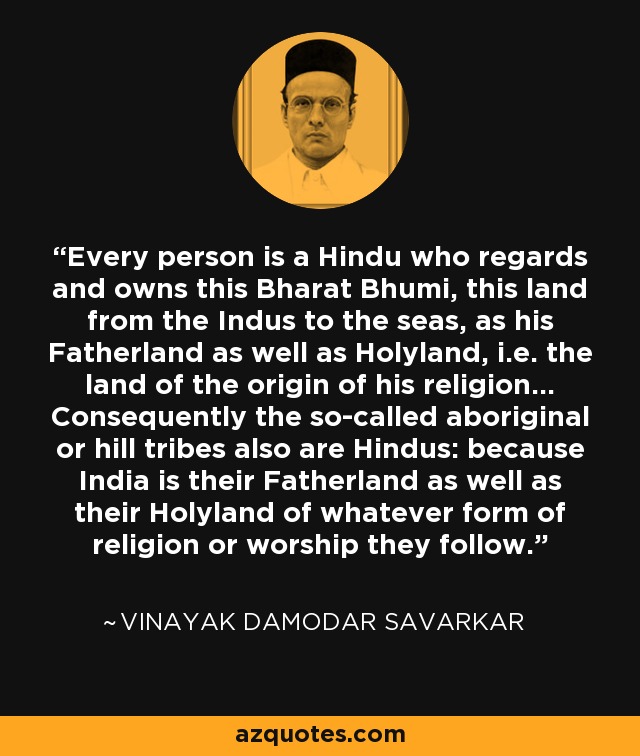You need to sign in or sign up before continuing.
Take a photo of a barcode or cover
After finishing reading this book, I am confused about whether to agree or disagree with his revolutionary opinion which protected us from fanatics of Europe and Arab nations. Though I don't have any reason to disagree with his opinion, I have my skepticism to agree with his opinion due to my lack of knowledge on this unexplored idea.
Reading this book is not an easy task, Excessive rich vocabulary is a bit daunting for readers because it is difficult to stay focused or attentive between the sentence. Due to that, I was able to grasp only important concepts and with the rest, I was lost.
He has used puranic stories, the Hindhu ruler's valor, and social changes across India to convince the readers of the importance of Hindutva and its existence from ancient times. His convincing skills are really powerful and inspiring.

Sarvakar clearly points out the distinction between Hinduism and Hindutva from the beginning of the book. Hindutva term is new to me, so I am not knowledgeable enough to write a review on Hindutva or on this book. Maybe after exploring the core ideas of Hindutva.
This is a must-read book for every Hindhu who wants to understand Hindutva and the ideas of being a Hindu.

The way he has conveyed his ideas, Ignite the fire of nationhood and prepare every nerve of you to sacrifice for your motherland.
Below two ideas are worth consideration. But I do suggest you read an entire book to understand these two below ideas to avoid considering them as radical.
"If the holy land and Fatherland are different ones for the people living in India or for that matter for the people of any Nation, the allegiance of such groups is torn between these two extremes. For Hindus, India is their Holy land and also their Fatherland. This is also not a problem with the Sister communities of Hindus like Sikhism, Jainism or Buddhism, etc., But this is especially a problem with people who were converted to foreign belief systems through sword and through other means of duress like Muslims and Christians because their holy land is lying elsewhere in the middle eastern deserts and the temptation to place allegiance towards their holy-land over and above their fatherland is possible, it is precisely for this reason we have today Pakistan which is created out of India."
" That it is a common misunderstanding to use the term Hindutva interchangeably with Hinduism, which should not be done. Hinduism is only a derivative of Hindutva. At best it is a sectarian term, with a positive connotation. Even if one is an atheist, as long as one agrees that this land is his pitrubhumi (Fatherland) he is still Hindu. Hence, Hindutva is an inclusive concept."
Reading this book is not an easy task, Excessive rich vocabulary is a bit daunting for readers because it is difficult to stay focused or attentive between the sentence. Due to that, I was able to grasp only important concepts and with the rest, I was lost.
He has used puranic stories, the Hindhu ruler's valor, and social changes across India to convince the readers of the importance of Hindutva and its existence from ancient times. His convincing skills are really powerful and inspiring.

Sarvakar clearly points out the distinction between Hinduism and Hindutva from the beginning of the book. Hindutva term is new to me, so I am not knowledgeable enough to write a review on Hindutva or on this book. Maybe after exploring the core ideas of Hindutva.
This is a must-read book for every Hindhu who wants to understand Hindutva and the ideas of being a Hindu.

The way he has conveyed his ideas, Ignite the fire of nationhood and prepare every nerve of you to sacrifice for your motherland.
Below two ideas are worth consideration. But I do suggest you read an entire book to understand these two below ideas to avoid considering them as radical.
"If the holy land and Fatherland are different ones for the people living in India or for that matter for the people of any Nation, the allegiance of such groups is torn between these two extremes. For Hindus, India is their Holy land and also their Fatherland. This is also not a problem with the Sister communities of Hindus like Sikhism, Jainism or Buddhism, etc., But this is especially a problem with people who were converted to foreign belief systems through sword and through other means of duress like Muslims and Christians because their holy land is lying elsewhere in the middle eastern deserts and the temptation to place allegiance towards their holy-land over and above their fatherland is possible, it is precisely for this reason we have today Pakistan which is created out of India."
" That it is a common misunderstanding to use the term Hindutva interchangeably with Hinduism, which should not be done. Hinduism is only a derivative of Hindutva. At best it is a sectarian term, with a positive connotation. Even if one is an atheist, as long as one agrees that this land is his pitrubhumi (Fatherland) he is still Hindu. Hence, Hindutva is an inclusive concept."